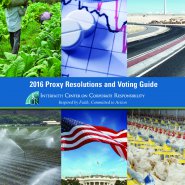 The silly season once again is upon us, and by that your writer doesn’t mean federal campaigning for political office for which he cares little or the prevalence of self-promoting entertainment awards programs for which he cares even less. Instead, he means the 2016 proxy shareholder resolution season, specifically as it applies to nuisance resolutions from religious investment groups having more to do with leftist agendas than rational corporate governance and … well, you know … religion.
The silly season once again is upon us, and by that your writer doesn’t mean federal campaigning for political office for which he cares little or the prevalence of self-promoting entertainment awards programs for which he cares even less. Instead, he means the 2016 proxy shareholder resolution season, specifically as it applies to nuisance resolutions from religious investment groups having more to do with leftist agendas than rational corporate governance and … well, you know … religion.
The Interfaith Center on Corporate Responsibility (marketing tagline: “Inspired by Faith, Committed to Action”) released earlier this month its 2016 Proxy Resolutions and Voting Guide. As of this writing, As You Sow hasn’t released its 2016 Proxy Preview, but familiarity with the past two volumes leads to anticipation of more of the same progressive targeting of publicly held companies on such issues as climate change mitigation, executive compensation and board diversity, and transparency on corporate donations and lobbying efforts (ICCR, at least, seems to have dialed back significantly efforts to curtail the use of genetically modified organisms).
These topics ostensibly fall under the Corporate Social Responsibility rubric as identified by both AYS and ICCR. However difficult it is connecting many of the above initiatives with CSR, it’s even more mind-boggling connecting the dots between AYS and ICCR clergy, nuns and other religious and the progressive causes for which they advocate. That is unless readers accept the premise that underneath every nun’s habit and clerical collar is an Erin Brokovich or Bill McKibben yearning to get out.
Here’s ICCR thumping its collective chest over its 2016 corporate targeting:
The number of resolutions filed by ICCR members for the 2016 AGM season rose just over 12% this season to 257, which include 5 filings slated for the spring, a continuation of a four-year trend. Corporate practices related to climate change risks, and lobbying and political spending continue to dominate as resolution themes and are primarily responsible for driving the overall increase in filings.
ICCR members filed a record 91 resolutions either directly or indirectly referencing climate change, more than at any time in their history, and 24 more than in the previous year. These filings were motivated in large part by growing recognition of the need for immediate and extensive action on climate change, and by this fall’s historic COP21 agreement in Paris, where 187 countries pledged to do their part to keep global warming below 2°C. Fifty-two resolutions dealt primarily with climate change, while an additional 39 addressed it indirectly, as one of multiple concerns. (For the purposes of this Guide, we categorize resolutions according to their primary focus. For instance, resolutions focusing primarily on lobbying and political contributions, but referencing GHG emissions, are considered lobbying resolutions, etc.)
What, precisely, do these proxy resolutions address? For one, there’s “membership in the Chamber of Commerce, which has mounted an attack on the EPA’s new Clean Power Plan addressing climate change.” Bad Chamber of Commerce! Shame on you! Of course, the U.S. Supreme Court issued a stay on President Obama’s Clean Power Plan already. As noted by David B. Rifkin Jr. and Andrew W. Grossman in the Wall Street Journal:
The dubious legal premise of the Clean Power Plan was that Congress, in an all-but-forgotten 1970s-era provision of the Clean Air Act, had empowered the Environmental Protection Agency to displace the states in regulating power generation. The EPA, in turn, would use that authority to mandate a shift from fossil-fuel-fired plants to renewables. The effect would be to institute by fiat the “cap and trade” scheme for carbon emissions that the Obama administration failed to push through Congress in 2009.
The agency also overstepped its legal authority by using a tortured redefinition of “system of emission reduction.” That statutory term has always been taken to give authority to regulate plant-level equipment and practices. Instead the EPA contorted the term to apply to the entire power grid. That redefinition, while necessary for the EPA to mount its attack on traditional power sources, violates the rule that federal statutes must be interpreted, absent a clear indication to the contrary, to maintain the existing balance of power between the federal government and the states. Federal law has long recognized states’ primacy in regulating their electric utilities, the economic aspects of power generation and transmission, and electric reliability.
There’s more … so much more, but readers are advised to follow the link in order to read the essay in its entirety. How any group much less one with religious affiliations could support such an unlawful and detrimental regulatory regime is beyond this writer’s imagination. Yet, here we go again. It’s going to be an interesting proxy season.
